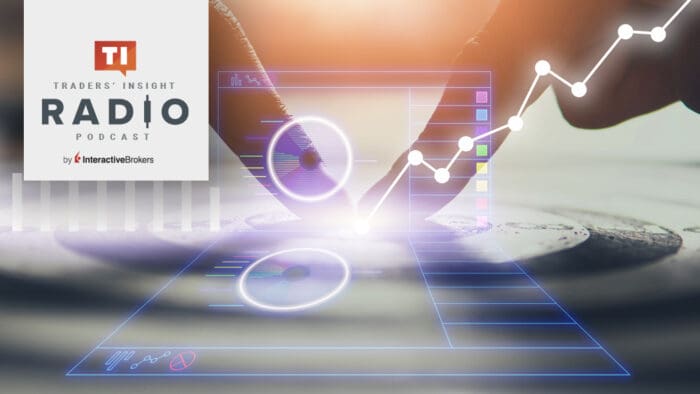IBKR senior market analyst Steven Levine speaks with Jan Szilagyi, CEO and co-founder of TOGGLE, about the potential benefits of using an artificial intelligence (AI)-powered platform for trading, and what market participants may expect from advanced technologies in the years ahead.
Summary -Traders’ Insight Radio Ep. 5: Using AI-Powered Trading Platforms: An Exchange with TOGGLE CEO Jan Szilagyi
The following is a summary of a live audio recording and may contain errors in spelling or grammar. Although IBKR has edited for clarity no material changes have been made.
Steven
Hello and welcome to IBKR Traders Insight Radio podcast. I’m Steven Levine, senior market analyst at Interactive Brokers, and your host of The AI Exchange. This is for all the latest insights into how artificial intelligence (AI) is transforming market sectors, and how traders can use this information to make more informed investment decisions.
AI already permeates most of our lives: the way we think; the way we respond; and the way we interact – from Google searches to self-driving cars to robotics to the metaverse and beyond.
AI is also no stranger to the tools employed by the financial markets. IBKR’s IBot, for example, is powered by artificial intelligence, and traders can use this simply by entering commands without the need to use precise wording like ‘what’s my P&L’ or ‘give me the latest market updates’. And with these, IBot immediately returns results.
Toggle AI is another company that services the financial sector. It’s a fintech platform that helps investors make better decisions, and we’re lucky to have Jan Szilagyi, the CEO of Toggle AI, here with us to tell us more about the benefits of using AI for trading and what we can expect from advanced technologies in the year ahead.
Jan has quite an impressive background. He’s spent most of his career managing global macro strategies, starting with Stan Druckenmiller at Duquesne Capital, and most recently as Co-CIO at Lombard Odier Investment Managers in New York. He graduated Phi Beta Kappa from Yale with degrees in math and economics and completed his PhD at Harvard under Ken Rogoff in quantitative finance … and that’s a lot.
Welcome Jan, we’re lucky to have you here with us. Welcome!
Jan
Thank you very much. It’s great to be here.
Steven
I thought we could start off by hearing your insights into some of the main benefits that AI provides for traders and how they can exploit them.
Jan
Sure, I mean, I think it’s obviously a very pertinent question currently, as people kind of think about AI and all of these different fields that you had mentioned. And then thinking, OK, well, how does that apply specifically to financial markets?
And I would say that maybe a good starting point is to highlight a challenge that most traders face today – which is: there is lots and lots of data available. There’s lots and lots of news and information out there, which has in many cases led to a cognitive overload.
How do you even know what matters anymore and what doesn’t? Should you be listening to Twitter? Should you be looking at CNBC? Should you be looking at the Bloomberg economic data releases? And so on.
I think it’s important to remember that it wasn’t always like this. For example, when Bloomberg Terminal first came out, actually the ability to have live prices and data in front of you was revolutionary. That was when it really democratized access to the data.
But I think 40 years on, we are in a world where data has become commoditized, and it’s processing and analyzing this data, curating it, distilling it … that has become where good traders have a real edge. And this is where AI can be extremely helpful, because it’s able to connect some of these dots on a much larger scale and much faster.
So, let me just give you an example: in the sense that on a day-to-day basis, an analyst might be able to look at maybe 5 or 10 stocks in some detail. But, just on our platform, the AI is able to go through 32,000 securities every single morning, and so it gives you a sense of the scale. And when you superimpose the ability to make some of these connections, it can create, as we hope to do, a truly intelligent dashboard that can be on a par with the experience that you have in these other areas like medicine, driving, even Alexa and Siri to an extent, that right now become commonplace in many people’s lives.
Steven
Yeah, I mean it, it’s really terrific. I mean, you’re absolutely right. Cognitive overload is truly something that I know I go through on a daily basis.
There’s a lot of information out there, and to distill that is quite critical. Can you point to some recent examples that traders could have taken advantage of that would have been entirely impractical without AI?
Jan
Yeah, so one of the things that the system will do for you is it doesn’t just parse through financial data such as earnings or analyst expectations and so on, but it also, on your behalf, reads and processes news … news articles. And so recently there was an interesting example where you take a company like Disney – and a company like Disney will have literally hundreds of articles published about it on a regular basis because people will either talk about the movies that have come out, or that are streaming, and this and that, and so the system picked up that there have been some articles that noted that actually, interestingly, Disney had started really aggressively discounting its streaming services.
Now, at the time, the stock was rising, doing really quite well – this was a few weeks back – and it was coming up to their earnings announcement as well. Now, what happened in the end is on the earnings call, they reported a very disappointing number of new subscribers, and so the stock in the aftermath tanked. It was down 20 to 25% in the aftermath, and so a user that would have been plugged into Toggle would have seen these articles highlighted as incrementally negative for the stock.
It didn’t take very much, or a lot of experience, for a trader to connect the dots and say, ‘well hold on a second’. One of the things that is really riding on this earnings call is what the new number of subscribers will be. The fact that they seem to be doing all of these aggressive promotions suggests that they may be desperate and really trying to get that number up to a certain point not to disappoint, and so maybe you would have reacted… Maybe you would have scaled down your position and so on.
So, that’s just one example where on an individual basis, it would be very easy to miss. This was, you know, a small part of one article amongst hundreds that are out there on this company, and we have other examples like this. But just to give you something very tangible and recent from the Toggle experience.
Steven
Well, so those catalysts can be really buried in the mounds of news that are out there, but AI can bring out certain very critical components to that news and make it rise to the surface.
I know that Disney has been very, very focused on its streaming services as opposed to, I suppose, the pandemic having hindered a lot of it’s more physical types of activities, like going to the theaters or even its theme parks, I suppose. So that it’s really incredible that AI is able to sift through so much information … to bring out a kernel of it that could be most important to a trader’s decision. It’s really great.
AI is doing so much already on your platform or platforms in general. So, how do you see it evolving throughout, say this year and does Toggle have any projects or something in the works to enhance its AI capabilities? Or how do you see it unfolding?
Jan
So let me maybe first give you the Toggle perspective and then we can talk about it more at a macro level, because I do think that, like in many other areas, I think we’re really just at the beginning of how much potential I think AI has in financial services and beyond.
So, you’re mentioning before for example, self-driving cars. We don’t really have them yet, but certainly cars today are substantially better than they were 20-30 years ago, and in some sense, you might call them smarter. Again, the definition of intelligence here is a precarious area to be walking on, but my point merely being that I think we are going to see some huge leaps in development going forward.
Specifically, when it comes to Toggle, phase one for us was to apply some of these algorithms to the area where it helps individual investors sifting through noise and information and identify interesting opportunities to invest in or potentially some hazards.
And actually, that’s not too dissimilar to how the experience of driving a car today might be. You are still deciding where your family should go on holiday, but as you drive to that destination, the car might tell you: Look, you know what? On I-95, there’s traffic building ahead. You might want to take a detour or just as you’re about to get on the offramp it says: ’There’s a car in your blind spot. Don’t do it just now.’ And it therefore prevents you from getting into potentially quite a bad accident.
The AI currently is able to do some of these things at the level of individual assets, where to the Disney example we discussed, it’s maybe able to distill things down from thousands of things that you could be spending your time on to two or three that, to you, instantly makes sense and hopefully improve your decision making. And so that’s what I would call ‘phase one’ of the Toggle development.
Now, phase two and phase three, looking forward out:
Phase two will be much more around the entire portfolio, so once you’ve now put together these individual trade ideas into a collection that you call your portfolio, the system will be able to generate insights about whether or not your portfolio as a whole is vulnerable, potentially to the rise in inflation that we’re seeing and the subsequent rise in short term rates. Is it vulnerable to a potential re-rating in PE multiples across the entire market and other types of systematic risks?
The third phase in this journey to becoming really the kind of the intelligent dashboard that users can connect and use with their brokerage is analyzing your trading style. And I think this is going to be possibly the most challenging, but also really a very rewarding stage, where you will be getting real-time feedback on what parts of your trading style may actually be responsible for your wins and what other habits might be responsible for your losses.
To give you a concrete example, the system might say: ‘Look, you tend to really be quite good at picking stocks, but you’re very bad at selling them.’ And what I mean by this is that the stocks that you pick generally outperform the overall market, but it turns out that you’re very slow in selling your losses. In other words, by the time you panic and get out, the stocks have generally already bottomed, and you end up offsetting a lot of your gains by driving these losses to numbers that just are unacceptable.
So, you might look back and be like, OK, so I’m somebody who panics too late. Maybe this is something that I can do. I can have tighter stop losses and so on. Or maybe the system says, ‘You’re really good at trading technology stocks, but you’re rubbish at trading industrials.’
And so, again, it’s just something where you get an objective picture. A little bit like you know people like Fitbit or any of the others – any of these other wearables that have become very popular – and you are getting a real-time feedback on your habits that you can say, ‘Oh, you know what, I’m going to make a tweak here’ or ‘maybe I should walk a little bit more every day,’ and so that would be the kind of the final phase.
Steven
So, am I off the mark in thinking this is a kind of self-driving portfolio risk management.
Jan
So, I think self-driving at this stage would be a stretch, right?
Because I think that the point here is we’re trying to empower the investor, not replace them. Again, just sticking with the car analogy, I think everybody is now probably a better driver because a car can virtually parallel park itself, which was a challenge for a lot of drivers, for example. But now you don’t have to do that, so it will offload certain things from your plate to let you focus on things where I think humans excel, which is forward-looking. And allowing the machine to do parsing of the past, which for a computer is just incredibly easy.
So, I would say that the period could be comparable to when we went from the era of supercomputers, when only the largest institutions could have that computing power, while cloud computing has now brought us into the age of the personal computer. So, effectively everybody can now have access to this unbelievable computational power, and you can carry it around in your pocket. It could be on your phone. Toggle effectively exists as an app on your phone. You don’t need to be plugged into any large supercomputer or anything. You’re effectively always connected.
Steven
Right, wow, it’s truly fascinating. It’s really fascinating, and we’d love to hear more about this topic. I know that our listeners can hear more about this topic by going to ibkrwebinars.com. You’ve got a great webinar presentation there called ‘Diamonds in the Rough, How to Find Undervalued Stocks,’ and you’ve got commentary on our Traders Insight platform as well. And listeners can go there and read more about Toggle and their commentary at tradersinsight.news. We’d love to have you back with us, especially as this continues to evolve and unfold.
It’s a fascinating, fascinating topic, Jan, thanks so much.
Jan
Thank you very much for having me. Always happy to join.
Steven
Yeah, great having you here. Thanks very much. Until next time, I’m Steven Levine for Interactive Brokers.
Disclosure: Interactive Brokers
The analysis in this material is provided for information only and is not and should not be construed as an offer to sell or the solicitation of an offer to buy any security. To the extent that this material discusses general market activity, industry or sector trends or other broad-based economic or political conditions, it should not be construed as research or investment advice. To the extent that it includes references to specific securities, commodities, currencies, or other instruments, those references do not constitute a recommendation by IBKR to buy, sell or hold such investments. This material does not and is not intended to take into account the particular financial conditions, investment objectives or requirements of individual customers. Before acting on this material, you should consider whether it is suitable for your particular circumstances and, as necessary, seek professional advice.
The views and opinions expressed herein are those of the author and do not necessarily reflect the views of Interactive Brokers, its affiliates, or its employees.















Join The Conversation
For specific platform feedback and suggestions, please submit it directly to our team using these instructions.
If you have an account-specific question or concern, please reach out to Client Services.
We encourage you to look through our FAQs before posting. Your question may already be covered!